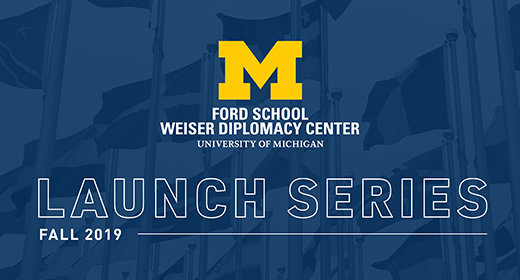
A lecture by Stephen Biegun, U.S. special representative for North Korea, will kick off a series of talks planned for the fall at the new Weiser Diplomacy Center housed at the Gerald R. Ford School of Public Policy at the University of Michigan.
Biegun, a U-M alum, will talk about "International Diplomacy Challenges: North Korea" at 1:30 p.m. on Sept. 6 at U-M's Rackham Amphitheatre. The lecture is free and open to the public.
"The Ford School is at the forefront of many of the challenging issues facing our world today, and the Weiser Diplomacy Center will further our ability to tackle such issues," said Michael Barr, the Joan and Sanford Weill Dean of Public Policy. "Bringing Stephen Biegun to speak to students about North Korea negotiations is a perfect example of this."
This new hub for the study and practice of diplomacy will bring in leaders in foreign affairs to campus for dialogue with students and the public to strengthen U-M's role as a national leader in international policy education.
The speaker lineup for lectures that continues until November includes former U.N. Ambassador Samantha Power, former U.S. Secretary of State Condoleezza Rice and former U.S. Secretary of State Hillary Rodham Clinton.
"Our fall speakers include a pantheon of foreign policy experts who have held leading roles over the past several U.S. administrations and in key international organizations," said John Ciorciari, director of Weiser Diplomacy Center. "Their engagement reflects the importance of the new Weiser Diplomacy Center and U-M's growing role as a hub for dialogue on world affairs."
The dates for the fall lectures are as follows:
- Sept. 6: Stephen Biegun, U.S. special representative for North Korea
- Sept. 13: Stephen Hadley, former national security adviser, Daniel Fried, former assistant secretary of state, and Liz Schrayer, president & CEO of U.S. Global Leadership Coalition
- Sept. 25: Former U.N. Ambassador Samantha Power
- Oct. 4: Former Secretary of State Condoleezza Rice
- Oct. 10: Former Secretary of State Hillary Rodham Clinton
- Nov. 21: Ambassadors Gerald Feierstein, John Limbert, Ronald Neumann and Deborah McCarthy
As part of the center’s opening, the Ford School welcomes its first cohort of Weiser Diplomacy Fellows. The fellowship is awarded to outstanding incoming graduate students who express deep interest in pursuing knowledge and practical policy skills related to diplomacy, national security, international economic development, and/or human rights. Fellows receive tuition support for two years of graduate study in international policy or international economic development. The first four fellows are Maggie Barnard, Edward Elliot, Marianna Smith, and Triana Yentzen Toro.
This fall, the center also will run an Environmental Diplomacy Simulation developed by Victoria Pebbles of the Great Lakes Commission.
The center was formed last year with a $10 million gift from U-M alumni Ron and Eileen Weiser.
By Mandira Banerjee, originally published on news.umich.edu.